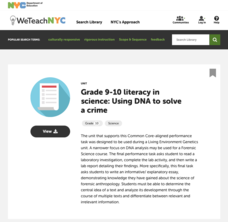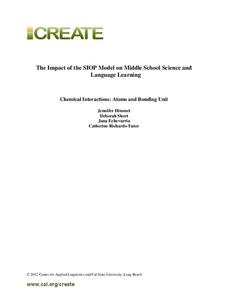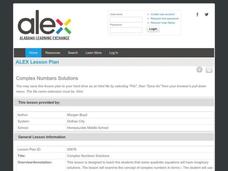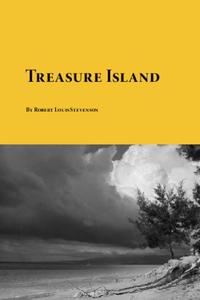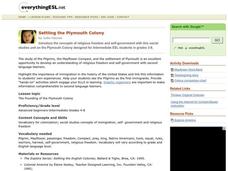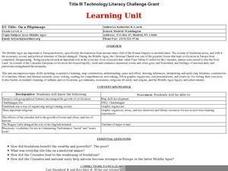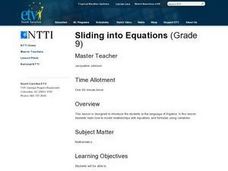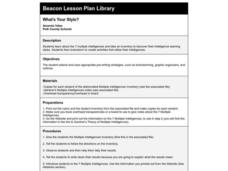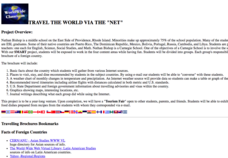Consortium for Ocean Science Exploration and Engagement (COSEE)
Understanding the Food Web
Building on prior knowledge of the pervious lesson in the series, pupils explain the previous lesson to each other. Then they write a simple guide for a young child to read on the same topic.
Laboratory for Atmospheric and Space Physics
Space Travel Guide
Looking to take a trip? Why not go to space? Here, scholars take on the role as travel agent to create a guide to their favorite planet including travel tips and sightseeing recommendations.
Orlando Shakes
The Taming of the Shrew: Study Guide
William Shakespeare's The Taming of the Shrew combines three things that are sure to capture scholars' attention: love, deception, and clown attire. With the curriculum guide, learners hone their opinion-writing skills and practice...
Franklin Covey
The Habits of Highly Effective Teens
Sally and Joe both want the last cookie in the jar, so they split it in half. That's an example of a win-win situation, one of the many principles Sean Covey outlines in his book The 7 Habits of Highly Effective Teens. Using the...
New York City Department of Education
Grade 9-10 Literacy in Science: Using DNA to Solve a Crime
Scholars become detectives and use science to solve a crime! A complete unit introduces DNA and includes hands-on activities that have learners model DNA and extract it from different food types. A culminating activity challenges...
Facing History and Ourselves
The Weimar Republic: Historical Context and Decision Making
Did you know that way before Hitler became a dictator, he actually spent nine months in a German jail? Provide the background for the escalating point before the Nazi party took over in World War II through the exercises in the resource....
Prestwick House
Writing Arguments in Response to Nonfiction
Emotional appeal or argument? That is the question. An informative lesson helps your class recognize the difference between a logical argument and an emotional appeal and learn how to craft an argumentative response. Writers develop a...
Center for Civic Education
What Is Authority?
Young scholars examine the concepts of power and authority as they begin learning about government in this elementary social studies lesson. Through a series of readings, discussions, and problem solving activities, children learn about...
Curated OER
Reading Poetry in the Middle Grades
Bring the beauty of "Nothing Gold Can Stay" by Robert Frost to middle school language arts. After learners read a copy of the poem, they follow an instructional sequence that focuses on sound, figurative language, and theme.
Curated OER
Dos mapas de Florida, el Caribe y parte de Sur America
What can maps tell us about the past? Find out with a Spanish lesson that incorporates geography. After examining maps individually, comparing two old maps of Spanish Florida and writing notes in the provided Venn diagram, pupils pair up...
Code.org
Good and Bad Data Visualizations
Good versus bad data. Pairs rate online collections of data representations from good to bad and then suggest ways to improve the visualizations. The class then creates a list of best practices and common errors in data representations...
Center for Applied Linguistics
Chemical Interactions: Atoms and Bonding
Watch budding chemists interact with the resource on chemical interactions. In the unit, six lessons provide an overview of basic chemistry, from understanding the development of atomic theory to distinguishing between ionic and covalent...
Alabama Learning Exchange
Complex Numbers Solutions
Complex doesn't have to mean harder! Learners experiment with online software to determine the quadratic equations with complex solutions. They use the quadratic formula to solve equations with both real and complex solutions.
Planet e-Book
Treasure Island
Simple yet convenient: this resource is a real treasure! Robert Louis Stevenson's adventure novel, Treasure Island, engages readers of all ages with its tales of treasure maps, buried gold, and pirates. With a sleek eBook, learners can...
Curated OER
Map Your School
Learners participate in a project to map their school. They measure and graph various areas around the school. Learners find the longitude and latitude of the school and research the school's history, and highlight special important areas.
Curated OER
What Is Your Explanation for the Evidence?
Students encounter an interactive computer program activity designed as a diagnostic of student beliefs related to the theory of evolution. Students process the Hypercard cascades structured around a set of biological topics related to...
Curated OER
Publishing History
Students create an issue of a magazine. They work collaboratively to write articles for the magazine, design a cover and develop advertisements. Students complete their page layout, and create the magazine using information form each...
Curated OER
Settling the Plymouth Colony
Students use the Internet and graphic organizers to research the Plymouth Colony the experience of the Pilgrims. Students compare and contrast different colonies and develop a timeline showcasing their research.
Curated OER
On a Pilgrimage
Sixth graders engage in a variety of learning experiences surrounding the study of the Middle Ages. They construct a map of Europe, create a graphic organizer for the hierarchy of feudalism, design their own family crest, and write their...
Curated OER
Getting to Know Government
Students read a passage about the government and identify why the seat belt law was created and then fill out a graphic organizer about the main idea and details they read. In this government lesson plan, students also create a poster...
Curated OER
Lab Safety
Students investigate the concept of lab safety using a variety of different activities. The equipment necessary is covered. They draw the different types of lab tools using a graphic organizer.
Curated OER
Sliding into Equations
Ninth graders translate sentences into equations. They translate equations into sentences. They solve real life problems using verbal models to write equations. They create a problem solution graphic organizer in their journals.
Curated OER
What's Your Style?
High schoolers examine and discuss the seven multiple intelligences. They take an inventory to identify their own learning styles and design activities that utilize their intelligences.
Project SMART
Travel the World Via the "Net"
Middle schoolers work together to create a travel brochure of a foreign country of their choice. They use the Internet to research their information. They create graphics showing interesting locations. They write in their journals at the...






